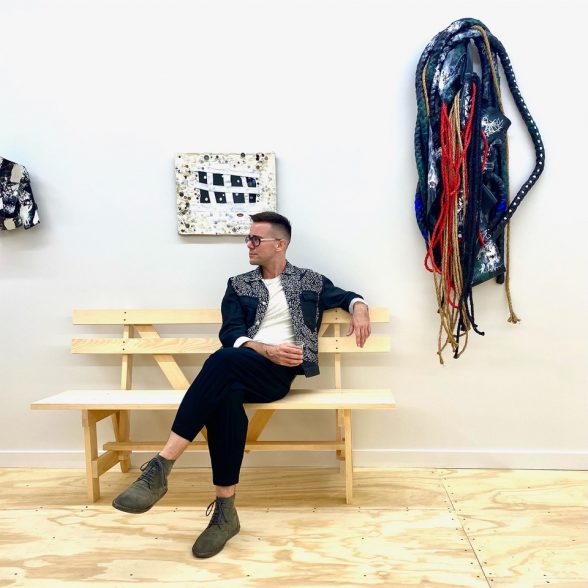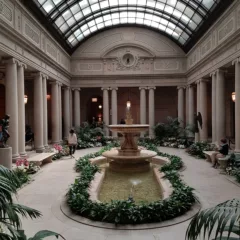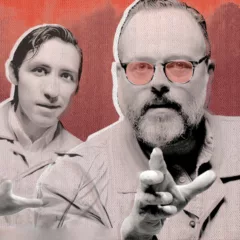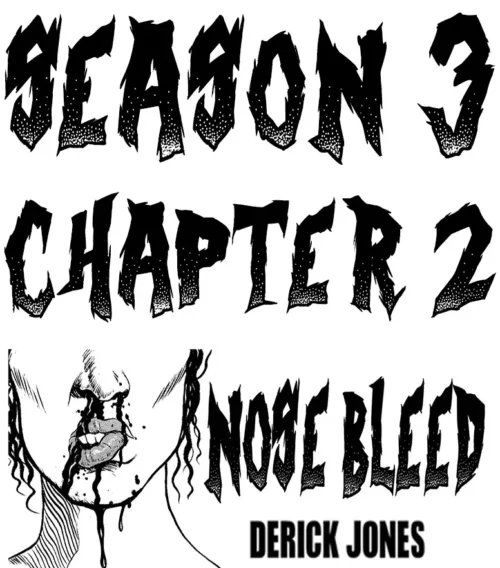Episode 271 – In this week’s Midweek News, Roberta shares two news updates on local galleries and a new opportunity. I offer this week’s recommendations on events happening this week including 2nd Thursday at Crane Arts. When end our conversation discussing English idioms and grammar. ~Ryan

Click to expand the podcast transcript
Roberta: Hi, it’s Roberta.
Ryan: And this is Ryan, and this is the Midweek News on Artblog Radio.
Roberta: Good morning, Ryan. How are you?
Ryan: Good morning. I’m doing well. How are you?
Roberta: Good. I’m back from Milwaukee and I had a wonderful time and we just switched states because you’re not here anymore. You went to Michigan, right?
Ryan: I am back in Michigan. It’s birthday season here with my family.
Roberta: Oh, birthday season. Yeah. Ours is winter. We have every single person, almost, is a winter birthday. I don’t know. Why do they congregate like that?
Ryan: I don’t know. We have a lot of Leos.
Roberta: Oh, interesting.
Ryan: Stuck around August.
Roberta: Well, happy birthday to all the Leos out there.
Yeah. Alright, so Michigan is going to be good. Is the weather good?
Ryan: Yeah, we’re in northern Michigan. Near Traverse City, so it’s a little bit cooler than Philly, which is kind of nice. I can appreciate that. And we’re, we’re near Lake Michigan, which gives you some — we’re on the east side of Lake Michigan — so you get nice sunsets as well.
Roberta: Beautiful. Speaking of Lake Michigan, Milwaukee was hotter than hell. It was really very hot and sunny and humid, like high humidity. So that was a surprise. It was sort of like not leaving Philadelphia in that respect. But Lake Michigan looks terrific from this side, from the Wisconsin side. The parks are pristine and the beach has all kinds of beach volleyball on it, there’s several beaches that are in the county park system, and so they have lifeguards and all kinds of sand that they truck in and volleyball. And then, I don’t remember tiki bars being on the beach, but they’ve got little stations of tiki bars where you can get your beverage and then play your volleyball. It looks really great. Looked really nice and beautiful. Sunrises over Lake Michigan.
Alright, anyway, let’s get onto the news since we’ve done the States. I want to say there’s a few things I want to talk to people about in the news today. The biggest one, I think the top headliner is Commonweal Gallery, which is run by Alex Connor and has been on Latimer Street, kitty corner from The Print Center for three years now. They just announced that they’re moving to Mascher Street in the — what’s being called the old Kensington Arts Corridor — which is near Crane Arts and the Clay studio and the American Street corridor. That’s very big news and it’s going to be a bigger space and maybe even a space that you don’t have to climb up steps to get to, which will be nice for everybody. More accessible is better. And Commonweal is also going to Art on Paper Fair in New York in September (5-8) with 17 local artists’ work. So that’s very exciting. And we know some of the artists, and in fact, Annette Monnier, if we’re going drop a name, is one of the 17 artists that will be at Commonweal’s Booth at Art on Paper.
Next, we have the Barnes Foundation and St. Joe’s University partnering for an online museum education graduate program. And this seems really a good thing for them to do online. You have to say, well, that’s not as good as in person, but it is a nice partnership that the Barnes Foundation, a museum that has museum curators and educators known for its education program is partnering with an institution like St. Joe’s that has an education program. You can get a PhD in education, I think, or at least a master’s from St. Joe’s University. So that’s, that’s good news. More collaboration. I’m all for it.
The Fabric Workshop and Museum announced they have a new executive director coming on board in September. Kelly Shindler. Will be replacing Harry Philbrick who has been interim since the previous executive director, Christina (Vassallo). Whose name I’m blanking on. We’ll fill that in in the transcript. Christina moved to Cincinnati to take a leadership position in a museum there – the Contemporary Arts Center. So the Fabric Workshop, all right! Kelly Shindler comes to them from Pew. She’s been at the. Pew Center for Arts and Heritage for I believe, eight or 10 years. And she has a lot of experience in fundraising and so this is always necessary for an executive director, and Bravo, and we’re happy to hear this news.
And I have one opportunity I want to mention. There’s something called the Philadelphia City Fund that has announced a subsidiary program, I guess you’d call it, called the Community Fund. So there’s a Philadelphia City Fund and then slash Community Fund. They’re offering a grant now that you can apply for an after school pre-K through 12 age range and nourish the mind, body and spirit. So presumably you’re going to nourish the bodies too. I think that’s important. You’ve got to feed the children in my opinion. But this is about nourishing the mind, so it sounds like a really good opportunity. We’ll put some more information about that and links into the transcript. And that application is due on August 26th. So that’s it for my news roundup. Ryan, what have you got?
Ryan: Yeah, so there’s some openings that are happening. This is coming up to Second Thursday, so you’re going to see a lot happening at the Crane Arts. One standout is Box Spring Gallery, one of the newer galleries. They have an opening reception coming up on the 8th.
Plays and Players has a poems and movies. Sometimes I dream in Farsi also on the eighth.
That quilt show that I mentioned, that 24-hour quilt-a-thon performance with live music going 24 hours open to the public during specific hours. That’s coming up at it’s going to be at Fleisher Art Memorial in the sanctuary on the 9th. So if you’re interested in that, well, the 9th and 10th I guess I should say. But that’s going to be quite an interesting show if you want to stop in and get your quilt on. I still think they’d be really good.
Roberta: I want to say that I was reading on the, I think it was Instagram, where they were putting some information about this, and the quilters are not going to be allowed to speak amongst themselves.
They’re going to whistle. It’s going to be whistling only. Oh my goodness. You can speak when you come. I mean, this is a thing. It’s a happening. It’s going to be really amazing. And I’m not sure that you, I think you can probably bring fabric to contribute. I’m not sure they’re going to let you, you know, pick up a needle and stitch with them. But I’d like to see the whistling quilters, yeah. I’ll be there.
Ryan: It looks like a lot of fun. So I’m curious how that turns out. Totally. And then I usually give you a theater pick. Starting August 9th is the 10-year celebration of Philly Women’s Theater Festival. That’ll be hosted at Theater Exile. There’ll be a lot of plays and readings and performances from August 9th through the 18th. At Theater Exile. So that’s 10 years of that. Well worth a look at that. Take a look. Those links and events are all on ArtBlogConnect.org. Find those all there.
And then the library has one coming up on the 16th, Roberta, that I was curious about. So obviously we do online publishing, so I was curious. Their event is August 16th. It’s called Black Tea Rhapsody, A Homage to African American Tea Culture. And I was curious, you know, whenever I see something like that, I think that grammar. Like is it a homage or an homage and do we say homage or like British, a hard H or a softer H like Americans or no H like the French, like it comes from homage. Like the French would say homage without the H. So you know, it’s one of those funny grammar things that are based on kind of how you say it. So if you say H hotel or (ho H) hotel, I guess it would be kinda something similar. So. I think that was really, really funny to always hear. So you can hear how someone speaks by how they are placing it grammatically.
Roberta: Yes, yes. Well, how they speak might be grammatical. You know, there’s vernacular speech that is acceptable and in the dictionary, and I understand what you’re saying and it is a funny sort of grammatical thing where, I would say an hotel. I think I’d even say an and pronounce the H of hotel. Or, would I say I’m going to get a hotel? I would, yes. I would say I’m going to get a hotel for the weekend.
Ryan: Yeah. Yeah. I would as well. I would say a hotel.
Roberta: A hotel? Yeah.
Ryan: But I would say an homage. Homage, yeah.
Roberta: Right. ’cause it’s kind of a French word and hotel is, yeah. I mean, anglicized, I think if it was French to begin with, but I don’t even know.
Ryan: Yeah.
Roberta: Grammar. Okay.
Ryan: Yeah. Hotel also is French which is funny because…
Roberta: Huh. Okay. Oh my, well,
Ryan: that’s all about how we speak. It’s kind of interesting,
Roberta: right? And grammar is. Peculiar. It just is peculiar. I mean, affect, effect. Does anybody ever get that right? I have to look it up. Every single time. AP style book in front of me always, because I don’t know what it is. I can’t memorize that. It’s just too slippery. And then I’ve been seeing, speaking of grammar, something that I think is really odd. You know, there’s English grammar. English ways. There’s English English, and there’s American English. Yeah. And in English English, a collective noun, like a sports team, a team gets a plural verb, like the team were going, meaning the group were going. It’s always a plural verb and that’s not the way we Americans deal with that over here, collective nouns. And we’d say the team was going, the team was going to the arena.
So, but lately, and not a lot, but I have seen in American newsfeeds a plural verb going with a collective noun. And I’m just thinking, is this creeping into our American English? That we’re now going to have to have a collective noun get a plural verb the way the British do?
I would prefer to keep our American English, actually. I, I like our American English.
Ryan: They have a lot of fun phrases and idioms. I wish Americans had more of those. Hmm. Obviously, the age of the language makes probably the biggest difference to that. And there’s only like one that I can think that we directly translated, which was “throw a wrench in the works.” They don’t say wrench, they say spanner.
Roberta: Oh, a spanner. Yes.
Ryan: I was trying to think of another one. Oh, like Bob’s your uncle.
Roberta: Oh, right. Mm-Hmm.
Ryan: I think it has a different meaning. I think like, I’m trying to think of one that’s like a one-to-one translation, but different words, but, Mm-Hmm. I guess we do, our family does “hacks and bodge,” but that’s might just be us.
Roberta: I don’t even know what that means. Hacks and bodge.
Ryan: So like if you’re making a repair, are you doing it, are you doing a hack, like you’ve come up with a new, clever way to fix something and make it work? Or is it a bodge, where it’s like just a little more duct tape and you’ll have success, or it’ll hold together just a little bit longer?
You know, that’s a bodge. Yeah. Is it, is it a good repair or a bad repair, kind of quality or not?
Roberta: Where did that come from, Ryan?
Ryan: I don’t know, British, I’m not sure where these phrases come from, but,
Roberta: Funny. Well,
Ryan: That’s it for me. That’s all I’ve got this week.
Roberta: No more grammar talk.
Ryan: I, well, I don’t have more on grammar.
Maybe next time
Roberta: Let’s research grammar and talk it up a little.
Ryan: Yeah, people are going to love that. There are a lot of shows, there are a couple podcasts though, that do talk about like etymology of words and where they came from and why we speak the way we do.
Roberta: I’m sure I could, people are interested in words and language.Yeah. It’s very fascinating stuff. Well, to be continued, let’s, let’s do some research here. Come back with some art words, etymology, and whatnot.
Ryan: Yeah. Yeah. And I think next week there’s more data that’s come in that I’d like to talk about. And there’s been some interesting articles that have been written.
Roberta: Oh, good.
Ryan: Talking about data, but also talking about art schools. Mm-Hmm. Closing of art schools and why.
Roberta: Mm-Hmm.
Ryan: So look for that next week. We’ll get into the meat and potatoes of that.
Roberta: Excellent! Meat and potatoes. That sounds like it’s an Americanism.
Ryan: I think so too.
Roberta: Okay, that’s it for Midweek News podcast. It’s Roberta. Thanks for listening
Ryan: This is Ryan, and this has been Artblog Radio’s Midweek News, bye bye.
Meet Our Hosts











